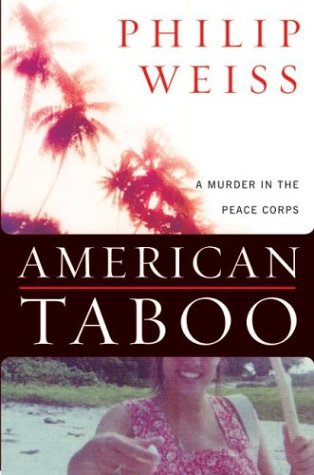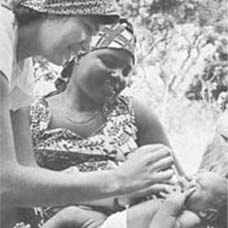December 17, 2004: Headlines: COS - Tonga: Crime: Murder: Safety and Security of Volunteers: San Francisco Chronicle: A book reopens memories of a Peace Corps volunteer Deborah Gardner's murder in Tonga more than 25 years ago
Peace Corps Online:
Directory:
Tonga:
Special Report: 'American Taboo: A Murder in the Peace Corps':
December 17, 2004: Headlines: COS - Tonga: Crime: Murder: Safety and Security of Volunteers: San Francisco Chronicle: A book reopens memories of a Peace Corps volunteer Deborah Gardner's murder in Tonga more than 25 years ago
American Taboo: A Murder in the Peace Corps
 | Charges possible in 1976 PCV slaying
Congressman Norm Dicks has asked the U.S. attorney in Seattle to consider pursuing charges against Dennis Priven, the man accused of killing Peace Corps Volunteer Deborah Gardner on the South Pacific island of Tonga 28 years ago. Background on this story here and here. |
 | American Taboo
Read the story of Volunteer Deborah Gardner's murder in Tonga in 1976 and how her killer has been free for the past 28 years with the help of the Peace Corps. Read an excerpt from Philip Weiss' book documenting the murder and coverup. Then read an essay by RPCV Bob Shaconis who says that Peace Corps' treatment as a "sacred cow" has exempted it from public scrutiny and that the agency has labored to preserve its shining reputation, sometimes at the expense of the very principles it is supposed to embody. |
A book reopens memories of a Peace Corps volunteer Deborah Gardner's murder in Tonga more than 25 years ago

A book reopens memories of a Peace Corps volunteer Deborah Gardner's murder in Tonga more than 25 years ago
Not so peaceful
A book reopens memories of a Peace Corps volunteer's time in Tonga -- and matters of life and death
Dave Murphy, Chronicle Staff Writer
Friday, December 17, 2004
Emile Hons paced across his San Bruno living room, talking on the phone to a stranger about memories he wasn't sure he wanted to bring back -- memories of a tragic incident in an idyllic place, half a world away, half a lifetime ago.
Not that he had ever forgotten Deborah Gardner. Not even close. More than 25 years after seeing her for the last time, Hons still sets aside a few quiet moments at 10 p.m. every Oct. 13, a remembrance of their time in the Peace Corps in Tonga, as colleagues, as friends, as lovers.
Often he'll think about Dennis Priven, the Peace Corps volunteer who became Hons' best friend during their first year in Tonga, the man from New York whom Hons describes as "almost scary intelligent." The man who stabbed Deborah Gardner to death.
Journalist Philip Weiss understood Hons' reluctance, but it was a seductive tale. Gardner was a 23-year-old from the Pacific Northwest, stabbed 22 times in an apparent mixture of jealousy and insanity.
But what led Weiss to pursue the story wasn't just the grisly slaying of a beautiful woman in an apparent love triangle, but how the Peace Corps helped Priven, paying for his defense -- he was found not guilty by reason of insanity, a defense previously unheard of in Tonga -- then flying him back to the United States.
And, even more, how a bungled arrangement between the U.S. and Tongan governments basically left Priven a free man in January 1977, three months after he killed Gardner.
Weiss planned to do an article, but it turned into a book: "American Taboo," published earlier this year. One of the first people he tracked down was Hons, who had accompanied Gardner's body from Tonga to Washington for her funeral.
Hons was easy to find. He had grown up in San Bruno and returned home just before Christmas 1976, just after testifying at Priven's murder trial. Not long after that, he began working at the Tanforan Park Shopping Center. He has been there ever since, serving as its general manager the last 10 years.
But when Weiss called him seven years ago, Hons was reluctant to open old wounds.
"I babbled off something," Hons recalled. "I was always very protective of Debbie and my relationship."
They spoke for less than half an hour. They had a couple of other phone conversations over the next three years, but Hons wasn't ready to open up.
Yet.
Hons was barely 25 when the Peace Corps sent him to Tonga in November 1974. He had taught pottery and jewelry-making at Pepperdine University, but didn't see his future there. The Peace Corps needed teachers in Tonga, and going there for two years would give him a chance to learn a lot about another culture -- and himself.
He and Priven became friends quickly. They got to know each other when their Peace Corps group stayed in Fiji for a few days before going to Tonga, and they were together when Priven bought a diving knife in Suva, a knife that he would wear nearly every day.
As the months passed, Hons and the other volunteers made friends with the Tongans, but shared a special camaraderie with one another.
"We were living in a new world," Hons said. "Everything was kind of different."
About a year later, another group of volunteers arrived, including Gardner.
"My first impression was her smile," Hons said. "Genuine, but it would light a room up."
He grew to admire her honesty, creativity and openness. "She wasn't too good for anybody. She would talk to everybody. She wasn't the prom queen."
Like many of the men, Priven was infatuated. But as the months went on and Gardner had romantic relationships with a couple of other volunteers, she made it clear that she didn't want anything more than a casual friendship with Priven.
She lived next door to Hons, and they became friends. In the summer of 1976, Hons said, "We started to get a little more serious." If he wasn't already in love with her, "I was heading down that road."
They were very discreet, partly because it was nobody's business and partly because of what appeared to be Priven's growing obsession with Gardner. Against her wishes, Priven showed up almost daily at her school, and his behavior was so strange that Gardner asked to transfer to another island, and Hons expressed concern to Peace Corps supervisor Mary George.
In October 1976, at a Peace Corps dinner for a new group of volunteers, Gardner got drunk and Hons took her home, going inside with her.
Looking back on it now, he believes that Priven must have followed them.
Five nights later, while Hons was out watching a movie with a friend, Priven entered Gardner's hut and confronted her. He stabbed her repeatedly with the diving knife, and then rode off on a bicycle when a 16-year-old Tongan heard Gardner's screams and yelled for help.
When Hons returned home shortly before 11 p.m., two boys ran up to him. Dennis had hurt Debbie, they said. Hons rushed inside.
"When I opened the door, it just froze my soul," he said. Blood was everywhere.
Gardner had been taken to a hospital, but it was too late.
A few hours past midnight, Priven surrendered to police.
Hons saw Priven in jail during that long night, and still remembers what Priven said when asked why he did it: "This just proves I'm insane."
Two days later, still recovering from the shock, Hons was cleaning out Gardner's hut, looking for mementos he could take to her family. He and Gardner each had kept a picture of the two of them, taken at Tonga's airport with another volunteer, Rich Dann.
"I found that picture crumpled up on her bed. I can only assume it was Dennis."
He kept the crumpled photo for himself. He put his own copy in her casket.
After going to Washington for the funeral and visiting his parents in San Bruno, Hons returned to Tonga. Once he finished testifying at Priven's trial, he came home for good on Christmas Eve.
But he couldn't leave the emotions behind.
"I had nightmares -- basically seeing what happened that night firsthand, which I didn't," he said. "My therapy was I'd walk -- 1 o'clock, 2 o'clock in the morning -- and think."
He would second-guess himself. What if he had complained louder about Priven to the Peace Corps? What if he hadn't gone to the movie that night?
"When I first got back, I was almost overwhelmed by what-ifs," Hons said. "After several months, I knew I had to focus on what is."
Author Weiss said that many volunteers still have trouble dealing with what happened.
"They were so young, so idealistic, so involved," he said. "They're still tortured by it at some level. I think there's a lot of (unwarranted) guilt with a lot of these people for the tiniest reasons."
In August 2000, Weiss was headed to Los Angeles for the Democratic National Convention, and asked Hons if he could visit him in San Bruno. Hons figured the conversation would take half an hour.
It lasted five.
"He slowly melted over the course of the interchange," Weiss recalled.
"At that point," Hons said, "I realized his dedication and his drive."
Hons dug up old photos and the notes he wrote for Gardner's eulogy. He helped persuade a Peace Corps colleague to talk with Weiss, and even met the writer in Tonga in July 2001 -- his first trip there since Priven's trial in 1976.
"When he made the emotional commitment to help me," Weiss said, "he did a lot of digging for himself."
Sometimes when you open an old wound, you get the chance to cleanse it.
"Emile hadn't dealt with this at some level," Weiss said. "In the last four years, he has."
Hons has returned to Tonga several times, even starting a Web site about the good times there (www.friendsoftonga.com). When he found out that the air tanks used by Tongan firefighters were woefully out of date, he and his colleagues in the San Bruno Rotary Club bought new ones for them, and Hons and the club have helped with other projects. He plans to visit again in February.
"It's been fun kind of giving back to a country I really enjoyed -- for at least 22 of those months," he said.
To acquaintances in San Bruno, Hons never came across as someone haunted by his past. You don't get to run a shopping center if you have a giant chip on your shoulder. People might have known he was in the Peace Corps, but telling them about a grisly homicide wouldn't exactly fit into cocktail party etiquette.
But what he saw had never left him.
"You don't see something like that once. You see it the rest of your life. "
He had many conversations with Weiss, and has talked with all sorts of people since the book came out. He was even interviewed by CBS for a "48 Hours" episode.
"I think talking about it so much has been therapeutic," Hons said. "What came back was all the great times that we had -- everything that had been eclipsed by the murder."
He has heard from childhood friends who read the book or saw "48 Hours." And longtime acquaintances now know what really happened, rather than what they had heard through rumors.
Hons smiled as he recalled how one woman he had known for years said that before she had read the book, she had "heard the story that you were in Togo, Africa, and a bunch of Bushmen had come out and carved up your girlfriend with knives."
There is still sorrow, certainly, as well as disappointment about how the Peace Corps unwittingly arranged for Priven to go free.
As "American Taboo" explains, the U.S. government promised Tongan authorities that Priven would be placed in a mental institution. Once Priven returned to the United States, however, he balked at being locked up, and the agreement with the Tongans carried little legal weight because he did not commit a crime here.
So Priven became a free man, living in Brooklyn, N.Y., and staying out of trouble. He worked for several years for the Social Security Administration, retiring last year.
"American Taboo" raises questions about whether Priven really was insane, or simply used guile to get away with murder. Hons said that at one point, Priven suggested that Hons "confess" near the end of Priven's murder trial. That would lead to an acquittal, and then Priven would admit he killed Gardner and free Hons -- knowing that he would be safe from prosecution because of double jeopardy laws.
Although Hons does believe that Priven was insane, and understands why the U.S. government felt obligated to pay for the defense, he is still bothered by the Peace Corps' actions after the trial. Gardner's parents didn't find out about Priven's release until Weiss told them, and Priven's Peace Corps record shows that he completed his service.
"They just wanted it to go away," Hons said. "I just think it was a crime committed by this country. To hide it from her parents, to let him go, to restore his record, it's like they were giving him a bonus.
"He was a good friend of mine, but what's wrong is wrong."
But just as Hons can still appreciate the good times he had with Priven, he hasn't let the Peace Corps' blunders sour him on the institution.
"I think the Peace Corps to this day is one of the best uses of taxpayer money."
In more ways than he could have ever expected, the two years in the Peace Corps did give Hons the chance to learn a lot about another culture -- and himself.
"I certainly grew up fast. Perhaps it made me trust in myself more because I had no idea what I was going to say or do" when he brought Gardner's body back for the funeral. "It made me more likely to go after a problem when I see it and not wait for someone else to solve it."
Not that those lessons could make up for losing Deborah Gardner. Not even close. And the memories of a tragic incident in an idyllic place have grown even stronger.
But so has he.
'American Taboo'
For more information about Philip Weiss' book "American Taboo:
A Murder in the Peace Corps" (HarperCollins, $25.95),
see www.harper collins.com.
E-mail Dave Murphy at dmurphy@sfchronicle.com.
When this story was posted in December 2004, this was on the front page of PCOL:
 | Our debt to Bill Moyers
Former Peace Corps Deputy Director Bill Moyers leaves PBS next week to begin writing his memoir of Lyndon Baines Johnson. Read what Moyers says about journalism under fire, the value of a free press, and the yearning for democracy. "We have got to nurture the spirit of independent journalism in this country," he warns, "or we'll not save capitalism from its own excesses, and we'll not save democracy from its own inertia." |
 | Is Gaddi Leaving?
Rumors are swirling that Peace Corps Director Vasquez may be leaving the administration. We think Director Vasquez has been doing a good job and if he decides to stay to the end of the administration, he could possibly have the same sort of impact as a Loret Ruppe Miller. If Vasquez has decided to leave, then Bob Taft, Peter McPherson, Chris Shays, or Jody Olsen would be good candidates to run the agency. Latest: For the record, Peace Corps has no comment on the rumors. |
 | The Birth of the Peace Corps
UMBC's Shriver Center and the Maryland Returned Volunteers hosted Scott Stossel, biographer of Sargent Shriver, who spoke on the Birth of the Peace Corps. This is the second annual Peace Corps History series - last year's speaker was Peace Corps Director Jack Vaughn. |
 | Charges possible in 1976 PCV slaying
Congressman Norm Dicks has asked the U.S. attorney in Seattle to consider pursuing charges against Dennis Priven, the man accused of killing Peace Corps Volunteer Deborah Gardner on the South Pacific island of Tonga 28 years ago. Background on this story here and here. |
Read the stories and leave your comments.

Some postings on Peace Corps Online are provided to the individual members of this group without permission of the copyright owner for the non-profit purposes of criticism, comment, education, scholarship, and research under the "Fair Use" provisions of U.S. Government copyright laws and they may not be distributed further without permission of the copyright owner. Peace Corps Online does not vouch for the accuracy of the content of the postings, which is the sole responsibility of the copyright holder.
Story Source: San Francisco Chronicle
This story has been posted in the following forums: : Headlines; COS - Tonga; Crime; Murder; Safety and Security of Volunteers
PCOL15432
53
.










